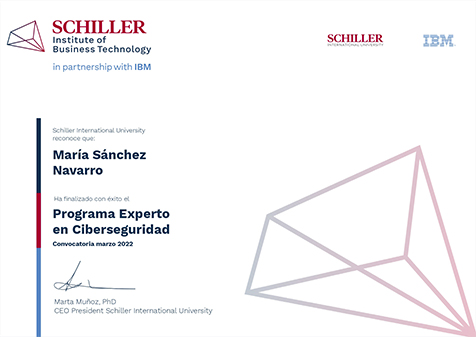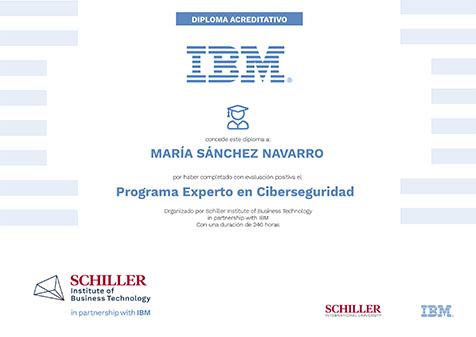
Executive
Program in
Artificial Intelligence
Diploma accredited by SCHILLER and IBM
Duration
45 h
Language
English
Hours
Wednesdays and Fridays
from 19:00 to 21:30
Next intake
September 2022
Format
Live
Online
100%
live classes
Precio
2.800€

This programme will help you understand how a business can harness the potential of its own data, how it can extract knowledge from data thanks to Artificial Intelligence, and how it can add value to a range of business processes.
Program objectives
Understand how a business can harness the potential of its own data and how it can extract knowledge from it
Study how companies are evolving through the use of AI
Implement the knowledge acquired during the course
Analyse the current use of AI and how it can add value to various business processes
Understand how to use AI in a responsible way and what the implications are

Aimed at:
This program is intended for students
and professionals without in-depth
knowledge or with basic knowledge
of Artificial Intelligence, who are
looking for a deeper understanding of
this field.
Why an Executive Program in Artificial Intelligence?
This program will help you understand how businesses can harness the potential of their own data, extract knowledge from it and add value to various business processes, using Artificial Intelligence. The program will include the IBM Garage – an end-to-end model for accelerating digital transformation -, real-world business case studies and practical examples to get the most out of the training.
In addition, the program also focuses on Responsible
Artificial Intelligence to promote the appropriate use of data in the business environment. This program for executives is a tour of the AI universe that will make you competent in efficiently analysing and implementing the knowledge you have learnt, thus propelling your professional profile to the next level.


Program
Module I: Artificial Intelligence, a cultural shift
This module covers the history of Artificial Intelligence, how it has evolved, what it is and what techniques exist. It explains how companies have adapted to change and where we are today.
Module II: Innovation, AI as a business priority
In this module, we will discuss actual case studies in which companies have used Artificial Intelligence to transform their business models and how you can improve your processes and innovate through the use of Artificial Intelligence.
Module III: AI in the Startup universe
I
In this module, we will look at actual case studies in which startups have used Artificial Intelligence to create products or new business models.
Module IV: Democratising Artificial Intelligence
The concept of Artificial Intelligence can sometimes sound like science fiction. In this module, we want to dispel concerns about its complexity and demonstrate the value that various profiles can bring to this type of project and which tools can be used.
Module V: Responsible Artificial Intelligence and its impact on business and society
Automating decisions through the use of technology can pose new challenges to organisations, such as the responsible use of data. This module examines the current situation, the challenges and problems that corporations are facing in this field, and the means being used to ensure the ethical and responsible use of Artificial Intelligence.
Module VI: Design applied to Artificial Intelligence projects
In most technology projects, we focus on the actual use of the technology but fail to think about the end users and the end experience of our solution. In this module, we will learn what to take into account, considerations, limitations, users’ wishes… before we start developing our Artificial Intelligence models and projects.
Module VII: How to generate an Artificial Intelligence Business Case
Artificial Intelligence projects require an investment in people and technology, therefore, in this module, students will be guided through real examples to learn how to generate a business case.
Module VIII: What to bear in mind in an AI project
Artificial Intelligence projects range from data collection to the production, monitoring and retraining of the models. In this module, students will learn about the different phases, challenges and requirements to manage the complete project cycle.
Module IX: Applied Artificial Intelligence I – Cognitive Call Center
Students will acquire hands-on experience in one of the most highly requested projects of recent years, transforming a Call Center so that, through technology and cognitive capabilities, it can respond to users 24×7 and scale automatically.
Module X: Applied Artificial Intelligence II – Natural language processing
One of the most widespread branches in terms of use and knowledge is natural language processing. During this session, students will learn how machines are capable of understanding human language and what the main benefits of this are.
Module XI: Company experience
In these sessions, companies with projects and large investments in Artificial Intelligence will tell us about their day-to-day challenges, how they address them, and what opportunities and advantages they have obtained through the power of Artificial Intelligence and data.
Module XII: End of Programme Challenge
Students will have to apply the knowledge acquired during the programme through a practical case study that will be presented in the classroom. It will be a guided challenge in which the teachers will provide the necessary guidance and support. A real company project will be simulated and the usual project design and implementation phases must be observed.
1. IBM Garage Methodology – Session in IBM Garage and students will learn how the methodology works and how to apply it to the practical scenario they will have to develop later.
2. Introduction to the case study – to successfully complete the course, students must work on a case study, which will be outlined during this session and which will help them to put the knowledge acquired during the course into practice. The Garage methodology created by IBM will be applied to develop the case study.
3. Case study review – Case study checkpoint and clarification of any issues.
4. Final Presentation. Final delivery of results and assessment by a multidisciplinary panel.

Methodology
The teaching method is primarily based on experiential, challenge-based learning. Students will solve actual IBM challenges in an international environment, thus enhancing the transformational power of the educational experience. This educational approach seeks to train professionals in the ability to use technology and put it at the service of society to meet the challenges of a global and diverse world.
IBM Garage is IBM’s approach to enabling companies to become agile, innovative and work more like startups. The IBM Garage experience seamlessly blends business strategy, design, and technology into a single, comprehensive experience.
• Co-create through Enterprise Design Thinking workshops, offered by top professionals.
• Co-execute to create, calculate, test and learn new ways of working.
• Cooperate to maintain rapid scalability and continuous cultural change.
With IBM Garage you derive measurable business value from innovation projects, drive cultural change through co-creation with IBM experts and leverage the momentum of iterative innovation to drive digital transformation at scale. You work alongside experts in design, architecture, agile methods, data science and AI, automation, blockchain and security, and have access to the latest AI and hybrid cloud technologies. IBM Garage is how the world’s leading companies are redefining themselves from the outside in.
Learn about IBM Garage
What happens at IBM Garage?
Accreditation Degrees



Teaching staff
María Borbonés
Program Director.
Computer Engineering (Cardenal Herrera CEU University, Valencia) and Master's in Artificial Intelligence (Polytechnic University, Madrid)
María has been working at IBM for 10 years, where she has been a technical specialist in cutting-edge technologies such as mobile, the Cloud and Artificial Intelligence. She currently serves as a Solutions Architect and Team Leader at the IBM Garage.
Iñigo Cavestany
Íñigo is a specialist for IBM Cloud in Spain. His mission is to be a trusted partner to his clients and to add value in the transformation of their businesses. His team is dedicated to building cloud solutions that solve major challenges and deliver tangible benefits.
Alejandro Delgado
Computer Science Engineer (Polytechnic University, Madrid).
IBM public cloud architect. Previously, he was responsible for innovation at IBM Spain’s business unit. He is a member of the committee of experts (TEC) in charge of providing technological advice to IBM’s Board of Directors.
Francisco José Izquierdo
Francisco holds a degree in Engineering from the Polytechnic University of Madrid. He has been working on Natural Language Processing technologies at IBM for more than 10 years, delivering training workshops and customer projects in this field
Irene Cid
Irene Cid has more than 3 years of experience in Artificial Intelligence and Software Development. She's got a BS in Electronics and Automatic Industrial Engineering, and a MS in Data Science. She is currently working as a Data Scientist at IBM, helping companies to boost their businesses through Artificial Intelligence and Data Science.
Contents of Interest
IBM LightBoarding Session: Operationalizing Artificial Intelligence Lifecycle
How IBM’s hyper-realistic Cyber TaHow does IBM Watson work?
Intro to IBM Watson
MarTech Forum entrevista a María Borbonés de IBM
Other programs
Business Technology
Expert Program/
Artificial Intelligence
Machine-Learning
Expert Program
Digital Transformation
For Business
Expert Program
Artificial Intelligence
Executive Program
Cybersecurity for
Business Expert
Program
Mindfulness for
Business Professionals/
Do you want to know more about our Artificial Intelligence Executive Program?
Completa el siguiente formulario y nos pondremos en contacto contigo




